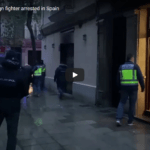On 16 October the General Commissariat of Information of the Spanish National Police (Policía Nacional – CGI) arrested two individuals for their alleged link to a terrorist organisation and on suspicion of recruiting and indoctrinating for the purpose of jihadist terrorism.
During an action day supported by Europol, Spanish police raided the homes of the suspects in the cities of Melilla and Mogán in Las Palmas de Gran Canaria. Law enforcement seized multiple mobile and electronic devices.
The terrorist group shared the so-called al-Qaeda ideology and aimed to impose an Islamic caliphate through violent jihad. The terrorist organisation existed and operated as an autonomous structure. The arrested suspects recruited women to expand the terrorist network. These women were then indoctrinated to join the terrorist organisation and become recruiters themselves. The terrorist organisation established polygamous marriages as a way to support its ambition of expanding its members and generating a future generation of terrorists.
During the action day, experts from Europol’s European Counter Terrorism Centre (ECTC) were deployed to provide on-the-spot support. This enabled real-time information exchange and analysis.
Más información
Europol. Artículo







Leave a Reply